|
|
|
Sort Order |
|
|
|
Items / Page
|
|
|
|
|
|
|
| Srl | Item |
| 1 |
ID:
119985
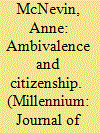

|
|
|
|
|
| Publication |
2013.
|
| Summary/Abstract |
Irregular migration gives rise to political claims that test the limits of political community and the expression of human rights in an increasingly interconnected world. This article provides a theorisation of the political claims of irregular migrants that starts with the notion of ambivalence. I argue that the ambivalence present in such claims can be understood as a political resource that is generative of new political relations across the terrain of human mobility and border control. In order to discern the generative quality of ambivalence, I argue in addition for an approach to theory production that is grounded in concrete migrant struggles. The argument is made via a critique of two theoretical perspectives that are influential amongst scholars working at the intersection of Migration Studies and Political and International Theory: the work of Giorgio Agamben and the 'Autonomy of Migration'. An approach that avoids the reductive accounts of power evident in both perspectives provides a better starting point from which to assess the transformative potential of irregular migrants' political claims.
|
|
|
|
|
|
|
|
|
|
|
|
|
|
|
|
| 2 |
ID:
167238
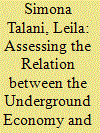

|
|
|
|
|
| Summary/Abstract |
A number of studies show the importance of the underground economy in defining the dynamics of migratory flows to southern European countries. A very high number of foreign-born workers are employed in the underground economy in Italy. However, by no means has the informal economy in the country been created by migrants. Instead, the opposite is true. Research demonstrates that it is precisely because the underground economy provides a wealth of employment opportunities that there is a strong incentive for migrants to access southern European countries, especially Italy, despite the difficulties in gaining regular migration status.
|
|
|
|
|
|
|
|
|
|
|
|
|
|
|
|
| 3 |
ID:
163588
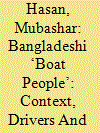

|
|
|
|
|
| Summary/Abstract |
Based on field research, this article focuses on the little-known phenomenon of Bangladeshi ‘boat people’ seeking entry to Thailand and Malaysia. It identifies how in a populous country of the Global South, familiar with various kinds of worker migration and movements of people, changing political, social and ecological contexts may generate and drive yet more manifestations of migration, also related to trafficking. In particular, certain developments in international relations connected to religious politics are shown to be instrumental in facilitating migration through legal and illegal channels. The interviews identify significant motivating factors that suggest an urgent need to develop policy recommendations, also in South Asia, to alleviate risks and suffering for irregular migrants and their families.
|
|
|
|
|
|
|
|
|
|
|
|
|
|
|
|
| 4 |
ID:
183923
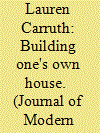

|
|
|
|
|
| Summary/Abstract |
This study uses ethnography along Ethiopian women's irregular migration routes through Djibouti to analyse the complex reasons women leave home to seek labour opportunities in the Gulf States. Theories and policies that either narrowly depict women's motivations as economic in nature or focus only on women's needs for security and protection, fail to account both for the politics of seeking employment abroad, and the ways migration provides women a potential refuge from various forms of violence at home. Using a feminist analysis, we argue that women do not migrate only for financial opportunities, but also to escape combinations of domestic, political and structural violence. As such, irregular migration both evinces a failure of asylum systems and humanitarian organisations to protect Ethiopians, and a failure of the state to provide Ethiopian women meaningful citizenship. Lacking both protection and meaningful citizenship, international migration represents women's journeys for opportunity and emancipation.
|
|
|
|
|
|
|
|
|
|
|
|
|
|
|
|
| 5 |
ID:
193274
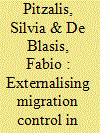

|
|
|
|
|
| Summary/Abstract |
The article investigates the role of the International Organization for Migration (IOM) in the global migration regime against the backdrop of the European Union (EU) border externalisation process in Niger. Over the last few years, UN agencies have been considered an essential component of the EU strategy to prevent irregular migrants from reaching Europe. Drawing on qualitative research and ethnographic fieldwork, combining empirical observation with critical analysis, we explore the ‘humanitarian–security nexus’ by focusing on the IOM's ‘humanitarian borderwork’ under the financial umbrella of the Emergency Trust Fund for Africa (ETFA). While the results of purely securitarian measures in Niger may have been ‘disappointing’, the outsourcing of migration management through IOM balances the interests of the Nigerien government and the EU. By focusing on IOM humanitarian operations and assisted voluntary returns and reintegration (AVRR) programmes, the article shows the further expansion of European humanitarian borders into the heart of the Sahel, highlighting new interdiction practices, hidden forms of deportation, side effects and contestation from below.
|
|
|
|
|
|
|
|
|
|
|
|
|
|
|
|
| 6 |
ID:
138407
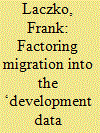

|
|
|
|
|
| Summary/Abstract |
Migration stories appear in the news around the world nearly every day. Migration is one of the most hotly debated policy issues and has grown in importance on the global agenda of the United Nations (UN). But how much do we really know about migration and the impact of migration policies and programs? Do we have the data to make a strong case for the inclusion of migration in the post-2015 development agenda? This article takes a hard look at the migration evidence base and outlines a set of recommendations to achieve a “migration data revolution” over the next decade. The article is written from a global perspective, and discusses data on both regular and irregular migration. It also considers how data are shared and used by policymakers, and why there is so little data on the impact of migration programs.
|
|
|
|
|
|
|
|
|
|
|
|
|
|
|
|
| 7 |
ID:
132336
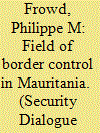

|
|
|
|
|
| Publication |
2014.
|
| Summary/Abstract |
Recent work on borders has tended to overlook border control actors, practices and rationalities in West Africa. States in this region are considered origin and transit countries for irregular migration, and the Sahel region that they straddle is widely seen as an emerging haven of terrorist activity. This article discusses one response to these migration and terrorism threats by the Islamic Republic of Mauritania: a programmme to build new border posts with help from global partners that include the European Union and the International Organization for Migration. The article builds on Bourdieusian approaches in critical security studies, but draws on concepts from actor-network theory to account for the heterogeneity of border control actors and the mobility of different knowledges about how to control borders. Drawing on ethnographic research in Mauritania, the article discusses four 'actants' of border security: the border posts, the landscape, the biometric entry-exit system and training practices. Throughout, the article highlights field dynamics of competition, cooperation and pedagogy, also emphasizing the role of non-human agency. The article concludes with a reflection on the link between border control and statebuilding, suggesting that this fusion is a broader paradigm of security provision in the global South.
|
|
|
|
|
|
|
|
|
|
|
|
|
|
|
|
| 8 |
ID:
178522
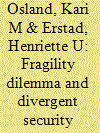

|
|
|
|
|
| Summary/Abstract |
Despite an exponential increase in international resources devoted to the Sahel, the situation on the ground continues to deteriorate. This is largely due to the so-called “fragility dilemma”, faced by fragile states that are in critical need of external assistance, but have limited absorption capacity and are governed by sitting regimes that dictate the terms and upon which external actors must rely. This dilemma has contributed to an increasing divergence between a state-centric regional and a people-centric transnational security complex. In particular, a heavy-handed approach to violent extremism and external policies aimed at curbing irregular migration have had a number of unintended consequences, disrupting livelihoods and further exacerbating instability in the Sahelian states.
|
|
|
|
|
|
|
|
|
|
|
|
|
|
|
|
| 9 |
ID:
192997
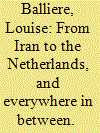

|
|
|
|
|
| Summary/Abstract |
A migrant's journey is no linear trajectory from A to B. It is a fragmented and complex move over different regions with alternating periods of mobility and immobility. This article researches the complex dynamics of irregular migration from Iran to the Netherlands, and everywhere in between. Through a historical comparison of the life stories of Iranian asylum seekers in the Netherlands in two time periods (1988–1989 and 2009–2010), it studies the routes they took, their relations with human smugglers, and their interactions with immigration policies and border managements along the way. It shows migrants' and smugglers’ flexibility and capacity to adapt to ever-changing circumstances. Migration politics and border controls, along with their increasing limitations on legal migration channels, are indeed crucial in the understanding of irregular migration practices and the ever-growing involvement of facilitating services. Through a combination of this migration policy research and the migration trajectory research, the paper explores these dynamics and the interactions between migrants, smugglers, and state policies in every phase of their journey from Iran to the Netherlands, and everywhere in between.
|
|
|
|
|
|
|
|
|
|
|
|
|
|
|
|
| 10 |
ID:
179999


|
|
|
|
|
| Summary/Abstract |
In recent years, Muslims have become more visibly invested in humanitarian work in France. Based on ethnographic fieldwork in Marseille, this article examines local initiatives to care for precarious others whose lives are neither materially supported nor socially recognized within the current French political regime. Engaging with critical French scholarship on humanitarianism as care for others associated with emergency, suffering and the politics of compassion, I show how food-distribution (maraudes) by Muslim-run humanitarian associations also draw from Islamic ethics of care. While social dynamics related to gender, class, race and generation structure the maraudes, the foregrounding of shared precarity, and of religious duty and piety over pity, challenges the ‘hierarchies of deservingness’ established by humanitarian border regimes. In caring for precarious others, Muslims must navigate both the secular suspicion directed towards Islam and the securitization of migration. Carrying out the religious duty of helping those in need, they are ‘laying claim to public space’ for both Muslims and precarious migrants.
|
|
|
|
|
|
|
|
|
|
|
|
|
|
|
|
| 11 |
ID:
132338
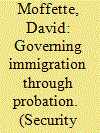

|
|
|
|
|
| Publication |
2014.
|
| Summary/Abstract |
Lacking an effective recruitment strategy and wanting to satisfy the demand for immigrant labour, Spanish authorities facilitated the entry of (mostly) Latin American 'tourists' in the early 2000s, knowing that many were migrants entering Spain to reside and work irregularly. This strategy is one of postponing control - a strategy of displacing some of the filtering work performed by borders and immigration selection across space and time. In this context, facilitating entry, policing the streets, regularizing 'deserving immigrants' and deporting 'undesirable foreigners' are analysed as complementary dimensions of a diffuse and flexible regime governing immigration through probation. It is argued that this displacement of borderwork allows for the creation of a probationary period during which the conduct of migrants is scrutinized and policed. This article describes the logics and practices of the various institutional actors involved in governing irregular migration in Spain, while paying attention to the role that discretion and competing interests play in the multi-scalar assessment of migrants' desirability.
|
|
|
|
|
|
|
|
|
|
|
|
|
|
|
|
| 12 |
ID:
143309
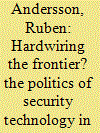

|
|
|
|
|
| Summary/Abstract |
Migration controls at the external EU borders have become a large field of political and financial investment in recent years – indeed, an ‘industry’ of sorts – yet conflicts between states and border agencies still mar attempts at cooperation. This article takes a close look at one way in which officials try to overcome such conflicts: through technology. In West Africa, the secure ‘Seahorse’ network hardwires border cooperation into a satellite system connecting African and European forces. In Spain’s North African enclaves of Ceuta and Melilla, advanced border fencing has joined up actors around a supposedly impenetrable divide. And on the EU level, the ‘European external border surveillance system’, or Eurosur, papers over power struggles between agencies and states through ‘decentralized’ information-sharing – even as the system’s physical features (nodes, coordination centres, interfaces) deepen competition between them. The article shows how such technologies, rather than ‘halting migration’, have above all acted as catalysts for new social relations among disparate sectors, creating areas for collaboration and competition, compliance and conflict. With these dynamics in mind, the conclusion sketches an ‘ecological’ perspective on the materialities of border control – infrastructure, interfaces, vehicles – while calling for more research on their contradictory and often counterproductive consequences.
|
|
|
|
|
|
|
|
|
|
|
|
|
|
|
|
| 13 |
ID:
182432
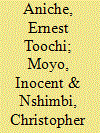

|
|
|
|
|
| Summary/Abstract |
The ‘coloniality’, porosity, and ‘ungovernability’ of borders in West Africa, have engendered undocumented migration, in which most people engage to visit their kin and for economic reasons such as herding, farming, fishing, hunting, and trading. This occurs concurrently with human smuggling, human trafficking, gun-running, terrorism, and money laundering. The rise in these cross-border criminal activities and the resultant insecurity have put irregular migration into the mainstream of political and academic conversation, generating national, regional, and global concerns. Against this backdrop, this paper examines the nexus between irregular migration and insecurity along ‘ungoverned’ borders in West Africa, based on a review of relevant literature on migration, security, and governance in scholarly journals, books as well as relevant reports, newspaper, and media accounts. The overarching question which this raises and is addressed in this paper is: How does the coloniality and porosity of ungoverned borders in West Africa engender and/or entrench cross-border insecurity? Addressing this question suggests the need to provide sufficient governance mechanisms that involve both state and non-state actors in order to reduce the ungoverned spaces in this part of Africa.
|
|
|
|
|
|
|
|
|
|
|
|
|
|
|
|
| 14 |
ID:
157627
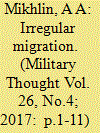

|
|
|
|
|
| Summary/Abstract |
The author examines the state of irregular migration that has developed over recent years on the European continent and its influence in creating new challenges and threats.
|
|
|
|
|
|
|
|
|
|
|
|
|
|
|
|
| 15 |
ID:
197145


|
|
|
|
|
| Summary/Abstract |
Australian foreign policy traditionally claims middle power and good international citizenship credentials, although it also resorts to unilateral actions due to its deep-rooted condition of ‘frightened country’. This article argues that the country's irregular migration governance embodies this tension, and thus seeks to shed light on this increasingly-neglected aspect of Australian external engagement. Following a theoretical understanding of Australian foreign policy, it investigates the country's irregular migration policies between 2000 and 2024. The article finds that there is a strong continuity in such policies irrespective of the type of government in power, supported by foreign policy bipartisanship, resulting in specific foreign policy tools to stem seaborne arrivals. These include military missions; territorial excisions from the migration zone; offshore processing and/or externalisation agreements with Nauru, Papua New Guinea, Cambodia, and Sri Lanka; pushback manoeuvres, and at-sea processing of asylum claims. Inevitably, such measures complicate Australia's international status as they emphasise the uneasy coexistence of both the globalist middle power and the self-interested nation images in its foreign policy, therefore warranting new research on this under-examined condition.
|
|
|
|
|
|
|
|
|
|
|
|
|
|
|
|
| 16 |
ID:
161954
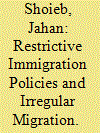

|
|
|
| 17 |
ID:
139494
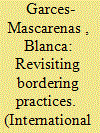

|
|
|
|
|
| Summary/Abstract |
Through a detailed case study of immigration policies in Malaysia, this article examines processes of bordering in a country where physical borders do not seem to play a pivotal role. It describes how, in Malaysia, immigration policies neither focus on border control nor pose strict limits on immigrants’ entry but rather seek to curtail immigrants’ presence once in the country. The analysis of this “securitization from within” allows us to make three interconnected arguments. First, no border control does not mean no immigration control. Second, confines or internal borders play a decisive role in the construction and preservation of a cheap, flexible labor force. However, despite the disproportionate power of the Malaysian executive, these confines are systematically challenged by immigrants’ everyday practices either by resorting to illegality or by reentering the country after deportation. Thus, when the contours of legality are very narrow, illegality does not necessarily mean a more subordinated form of existence but rather a way to resist state control. Third, both foreigners and citizens can be deprived of their most basic rights. In this regard, the conventional wisdom that citizenship draws a clearly defined line of exclusion/inclusion proves to be wrong in the case of Malaysia.
|
|
|
|
|
|
|
|
|
|
|
|
|
|
|
|
| 18 |
ID:
153110
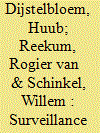

|
|
|
|
|
| Summary/Abstract |
The relationship between vision and action is a key element of both practices and conceptualizations of border surveillance in Europe. This article engages with what we call the ‘operative vision’ of surveillance at sea, specifically as performed by the border control apparatus in the Aegean. We analyse the political consequences of this operative vision by elaborating on three examples of fieldwork conducted in the Aegean and on the islands of Chios and Lesbos. One of the main aims is to bring the figure of the migrant back into the study of border technologies. By combining insights from science and technology studies with border, mobility and security studies, the article distinguishes between processes of intervention, mobilization and realization and emphasizes the role of migrants in their encounter with surveillance operations. Two claims are brought forward. First, engaging with recent scholarly work on the visual politics of border surveillance, we circumscribe an ongoing ‘transactional politics’. Second, the dynamic interplay between vision and action brings about a situation of ‘recalcitrance’, in which mobile objects and subjects of various kinds are drawn into securitized relations, for instance in encounters between coast guard boats and migrant boats at sea. Without reducing migrants to epiphenomena of those relations, this recalcitrance typifies the objects of surveillance as both relatable as well as resistant, particularly in the tensions between border control and search and rescue.
|
|
|
|
|
|
|
|
|
|
|
|
|
|
|
|
| 19 |
ID:
190823
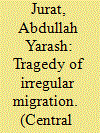

|
|
|
|
|
| Summary/Abstract |
This paper analyses irregular Afghan migrants in Turkey based on a qualitative field research study conducted in the cities of Ankara, Bursa, Malatya, Kayseri and Istanbul (see Note 1 on use of the term ‘Afghan’). It focuses on their migration journey, the factors driving migration and post-migration challenges. This research seeks to answer why Afghan irregular migrants are mainly male adults and how the employers in Turkey treat them. Afghan migrants in Turkey are mainly unskilled members of the labour force, typically working in construction, in supermarkets, as shepherds and in kitchens. This study argues that Afghan migration motives are mainly driven by humanitarian and economic deprivation. However, when they arrive in Turkey, migrants have no legal protection and are thrown into despair by their employers’ mistreatment.
|
|
|
|
|
|
|
|
|
|
|
|
|
|
|
|
| 20 |
ID:
177996
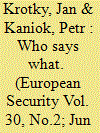

|
|
|
|
|
| Summary/Abstract |
As migration and its securitisation change the political environment in the EU, we examine whether security speech acts (restrictive suggestions) prevail over human security speech acts (a liberal approach) towards irregular migration in the eighth (EU) parliamentary debates and which structural determinants predict delivering one or the other speech act. To achieve this goal, we first conducted a content analysis by which we selected (human) security speech acts; then, a set of binary logistic regressions followed. We explored whether, in the plenary debates, members of the European Parliament propose human security speech acts towards irregular migration rather than security speech acts. Thus, it seems that the attitudes of the members of the European Parliament differ in plenary sessions from the decision-making process. Based on the set of binary logistic regressions, we argue that the left-right division, attitudes toward European integration, and especially the division between the new and old member states are the crucial structural determinants for delivering (human) security speech acts in the plenary speeches.
|
|
|
|
|
|
|
|
|
|
|
|
|
|
|
|
|
|
|
|
|